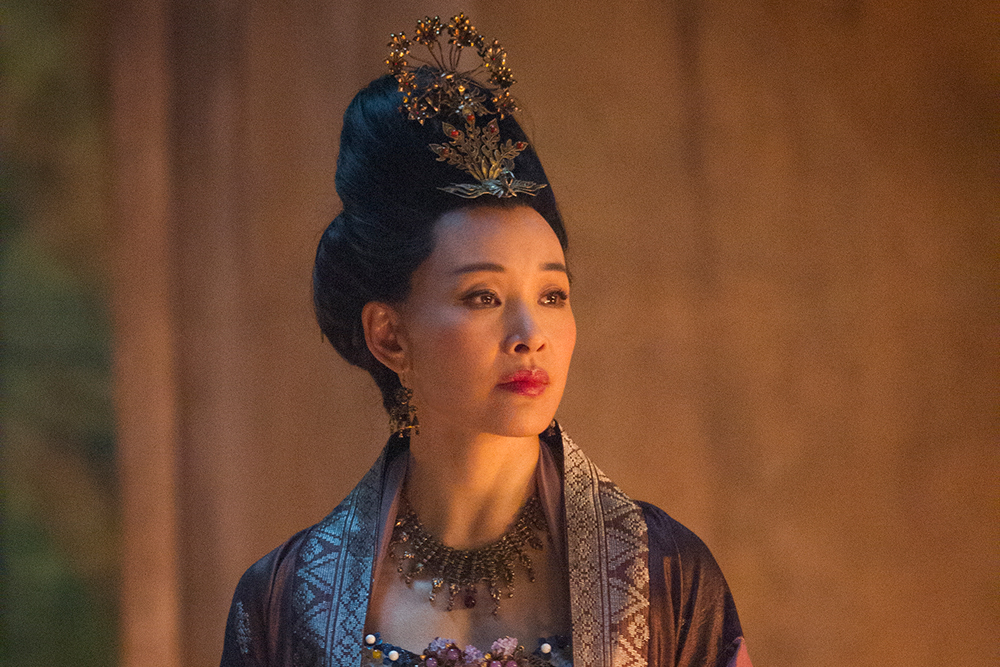By Vivian Nguyen
Northwest Asian Weekly

Joan Chen “Marco Polo”
Streaming content is becoming more common among modern viewers with online heavyweights like Netflix and Hulu revolutionizing how people consume movies and television.
Netflix’s “Marco Polo,” a period drama inspired by explorer Marco Polo and his time in the court of Mongolian general and Emperor Kublai Khan, is one such show that’s leading the way in streaming content. “Marco Polo” debuted in late 2014 and recently dropped its second season on Netflix.
Although Netflix doesn’t release ratings figures, its makers cite independent analytics company Parrott Analytics, which notes “Marco Polo” as the second most-watched original digital series and the 10th most-watched series across all platforms.
“Marco Polo” is also known for being one of the most expensive television shows ever produced, with a cast that is notably comprised of 98 percent minority actors.
In short, “Marco Polo” is an example of how Netflix takes big bets on shows that aren’t typically found on mainstream networks.
Actor Joan Chen, who plays Empress Chabi on “Marco Polo,” sat down with the Northwest Asian Weekly to chat about her role and how streaming television is redefining viewership and opportunities for Asian and Asian American actors. Chen is best-known for her movie roles in “Little Flower,” “The Last Emperor,” and “Saving Face,” as well as her character on the cult classic TV series “Twin Peaks.”
On how she got involved with the show: “For a long time, I hadn’t read anything that was meaningful to me,” said Chen. “I’d just given up on Hollywood, raised my kids, and went to China to work. But when I read ‘Marco Polo,’ this show felt like my calling.”
Although Netflix provided the financial backing and greenlit the show, key players like the show’s creator John Fusco also played a pivotal role in bringing justice to the stories of the Asian characters on the show. Fusco, who is also a writer and producer, has a very open love and understanding of Asian culture, heritage, and history.
“John loves Asian culture — he practices martial arts, studies the theory of martial arts, and truly respects the heritage and history,” said Chen. “And to me, that is wonderful.”
After hitting it off with Fusco and seeing his obvious respect for Asian culture, Chen felt confident in the show’s leadership and direction. Fusco and the show’s writers helped Chen get acquainted with Empress Chabi, and recommended “The Secret History of the Mongol Queens” to read for inspiration and insight. The book revealed how Mongol queens performed their duties, often serving as advisers for their kings. This helped inform how Chen portrayed Empress Chabi.
“Mongols really valued queens as much as kings,” said Chen. “In a way, queens had equal power to them, and that gave me the initial idea on how to create the character. Chabi isn’t on the battlefield, but she’s not shy about offering advice and expressing her opinion.”
Indeed, outspoken, confident, and bold Asian female characters — and the actors that play them — are plentiful in “Marco Polo,” with Chen playing the show’s matriarch. This is especially interesting given the show’s time period, where many of the female characters, like prostitutes, are viewed as commodities in the eyes of male characters. As a result, Asian female actors face different challenges from their male counterparts.
“We have specific barriers as female actors,” said Chen. “There is always the danger of some kind of stereotype. Sometimes you need to ask: Are we being stereotypical [in the roles we choose]? Are we the sexy, exotic creatures? The cunning, foxy dragon lady?”
This is where the episodic television format comes into play. What sets the Asian female characters apart on “Marco Polo,” explained Chen, is that these characters have the course of 10 episodes per season to develop into three-dimensional, complex characters with depth.
Working on streaming television content, versus on a mainstream network show, also means receiving a season’s scripts all at once. Chen said this allows the actor to plan an arc for the character — including a range of emotions over time — that can be seen as a long feature to the viewer.
“It’s been refreshing to work with so many Asian female actors, especially on such a high-budget show,” said Chen. “Sometimes we [Asian Americans] say, ‘We don’t have enough visibility,’ or we protest this and that. But ultimately, [television and film] is a business, and we as actors have to do our best so our shows are entertaining and of great quality. We’ve enabled many newcomers of different nationalities and ethnicities to get visibility.”
Because of Netflix’s unique business model focused on catering to niche audiences, like Asians and Asian Americans, this has created opportunity and growth for Asian actors from across the globe. Chen said, “Netflix is being smart because the demographic is changing — minorities are big consumers now. If you don’t include diversity in your shows, your business isn’t going to thrive.”
No word yet on whether “Marco Polo” will be picked up for a third season. Although Chen has no idea about the show’s fate, she admits that she’s ready to get behind the camera.
“With all these shows involved with minority issues and characters — they inspire me,” said Chen. “Now I want to start developing more projects … that spotlight more minority characters!”
Vivian Nguyen can be reached at info@nwasianweekly.com.




Where is Season 3…Not right to not have the Season 3. I was looking forward to Season 3.,Probably many other people are too.